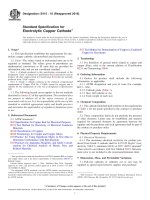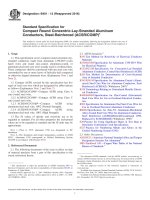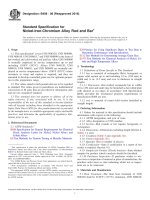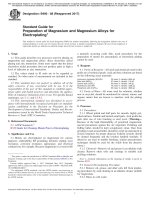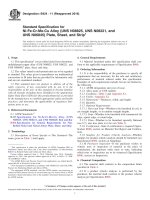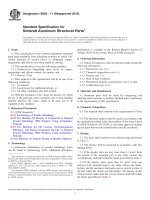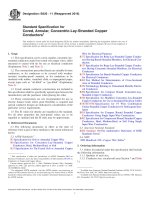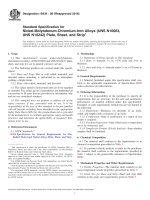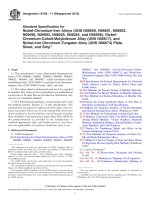Astm b 602 88 (2016)
Bạn đang xem bản rút gọn của tài liệu. Xem và tải ngay bản đầy đủ của tài liệu tại đây (104.19 KB, 6 trang )
Designation: B602 − 88 (Reapproved 2016)
Standard Test Method for
Attribute Sampling of Metallic and Inorganic Coatings1
This standard is issued under the fixed designation B602; the number immediately following the designation indicates the year of
original adoption or, in the case of revision, the year of last revision. A number in parentheses indicates the year of last reapproval. A
superscript epsilon (´) indicates an editorial change since the last revision or reapproval.
priate safety and health practices and determine the applicability of regulatory limitations prior to use.
1. Scope
1.1 This test method gives sampling plans that are intended
for use in the inspection of metallic and inorganic coatings for
conformance to ASTM standard specifications.
2. Referenced Documents
2.1 ASTM Standards:3
B697 Guide for Selection of Sampling Plans for Inspection
of Electrodeposited Metallic and Inorganic Coatings
B762 Test Method of Variables Sampling of Metallic and
Inorganic Coatings
2.2 ANSI Standard:4
ANSI/ASQC Z1.9-1979 Sampling Procedures and Tables
for Inspection by Variables for Percent Non-Conformance
2.3 Military Standards:5
MIL-STD-105D Sampling Procedures and Tables for Inspection by Attributes
MIL-STD-414 Sampling Procedures and Tables for Inspection by Variables for Percent Defective
1.2 The plans in this test method, except as noted, have been
selected from some of the single sampling plans of MIL-STD105D. The specific plans selected are identified in Tables 1-3 of
this test method. The plan of Table 4, which is used for
destructive testing, is not from the Military Standard. This
standard does not contain the Military Standard’s requirement
for tightened inspection when the quality history of a supplier
is unsatisfactory.
1.3 The plans are based on inspection by attributes, that is,
an article of product is inspected and is classified as either
conforming to a requirement placed on it, or as nonconforming.
Sampling plans based on inspection by variables are given in
Test Method B762. Variables plans are applicable when a test
yields a numerical value for a characteristic, when the specification imposes a numerical limit on the characteristic, and
when certain statistical criteria are met. These are explained in
Test Method B762.
3. Terminology
3.1 Definitions:
3.1.1 destructive test—test that destroys the tested article or
makes it nonconforming to a requirement.
3.1.2 inspection lot—collection of articles of the same kind
that is submitted to inspection for acceptance or rejection as a
group.
3.1.3 nondestructive test—test that neither destroys the
tested article nor makes it nonconforming to a requirement.
3.1.4 sample—articles randomly selected from an inspection lot whose quality is used to decide whether or not the
inspection lot is of acceptable quality.
1.4 The plans in this test method are intended to be
generally suitable. There may be instances in which tighter or
looser plans or ones that are more discriminating are desired.
Additional plans that may serve these needs are given in Guide
B697. Also, Guide B697 describes the nature of attribute
sampling plans and the several factors that must be considered
in the selection of a sampling plan. More information and an
even greater selection of plans are given in MIL-STD-105D,
MIL-STD-414, ANSI/ASQC Z1.9-1979, Refs (1-7)2, and in
Guide B697.
1.5 This standard does not purport to address all of the
safety concerns, if any, associated with its use. It is the
responsibility of the user of this standard to establish appro-
4. Significance and Use
4.1 Sampling inspection permits the estimation of the overall quality of a group of product articles through the inspection
of a relatively small number of product items drawn from the
group.
1
This test method is under the jurisdiction of ASTM Committee B08 on Metallic
and Inorganic Coatingsand is the direct responsibility of Subcommittee B08.10 on
Test Methods.
Current edition approved Nov. 1, 2016. Published November 2016. Originally
approved in 1975. Last previous edition approved in 2010 as B602 – 88 (2010).
DOI: 10.1520/B0602-88R16.
2
The boldface numbers in parentheses refer to the list of references at the end of
this standard.
3
For referenced ASTM standards, visit the ASTM website, www.astm.org, or
contact ASTM Customer Service at For Annual Book of ASTM
Standards volume information, refer to the standard’s Document Summary page on
the ASTM website.
4
Available from American National Standards Institute (ANSI), 25 W. 43rd St.,
4th Floor, New York, NY 10036, .
5
Available from Standardization Documents Order Desk, DODSSP, Bldg. 4,
Section D, 700 Robbins Ave., Philadelphia, PA 19111-5098.
Copyright © ASTM International, 100 Barr Harbor Drive, PO Box C700, West Conshohocken, PA 19428-2959. United States
1
B602 − 88 (2016)
TABLE 1 Level I—Sampling Plan for Nondestructive TestsA
Inspection Lot Size
1 to
20B
21 to
280
281 to 1 200
1 201 to 3 200
3 201 to 10 000
10 001 to 35 000
Over 35 000
A
B
Sample Size
Acceptance
Number
AQL, %
50/50 Point, %
LQL, %
AOQL,%
all
20
80
125
200
315
500
0
0
1
2
3
5
7
...
0.26
0.44
0.65
0.68
0.83
0.80
...
3.4
2.1
2.1
1.8
1.8
1.5
...
11.0
4.8
4.3
3.3
2.9
2.4
...
1.8
1.1
1.1
0.97
1.0
0.90
Taken from MIL-STD-105D, Single Sampling Plan, Level II, AQL = 0.65, Normal Inspection.
The smallest lots are 100 % inspected, and so there is no sampling risk. For this reason, there are no AQL, etc.
TABLE 2 Level II—Sampling Plan for Nondestructive TestsA
Inspection Lot Size
B
1 to
8
9 to
90
91 to
280
281 to
500
501 to 1 200
1 201 to 3 200
3 201 to 10 000
10 001 to 35 000
Over 35 000
A
B
Sample Size
Acceptance
Number
AQL, %
50/50 Point, %
LQL, %
AOQL,%
all
8
32
50
80
125
200
315
500
0
0
1
2
3
5
7
10
14
...
0.64
1.1
1.7
1.7
2.1
2.0
2.0
1.9
...
8.3
5.2
5.3
4.6
4.5
3.9
3.4
2.9
...
25
12
10
8.2
7.4
5.9
4.9
4.0
...
4.6
2.6
2.7
2.4
2.5
2.2
2.1
1.9
Taken from MIL-STD-105D, Single Sampling Plan, Level II, AQL = 1.5, Normal Inspection.
The smallest lots are 100 % inspected, and so there is no sampling risk. For this reason, there are no AQL, etc.
TABLE 3 Level III— Sampling Plan for Nondestructive TestsA
Inspection Lot Size
Sample Size
Acceptance
Number
AQL, %
50/50 Point, %
LQL, %
AOQL,%
all
5
20
32
50
80
125
200
315
500
0
0
1
2
3
5
7
10
14
21
...
1.0
1.8
2.6
2.8
3.3
3.2
3.1
2.9
3.0
...
12.9
8.2
8.2
7.3
7.1
6.1
7.3
4.7
4.3
...
37
18
16
13
11
9.4
7.7
6.4
5.6
...
7.4
4.2
4.3
3.9
4.0
3.6
3.3
3.0
2.9
1 to
5B
6 to
50
51 to
150
151 to
280
281 to
500
501 to 1 200
1 201 to 3 200
3 201 to 16 000
16 001 to 35 000
Over 35 000
A
B
Taken from MIL-STD-105D, Single Sampling Plan, Level II, AQL = 2.5, Normal Inspection.
The smallest lots are 100 % inspected, and so there is no sampling risk. For this reason, there are no AQL, etc.
TABLE 4 Sampling Plan for Destructive TestA
Inspection Lot Size
1 to
25
26 to 1 200
1201 to 35 000
Over 35 000
5. General
Sample
Size
Acceptance
Number
AQL,%
50/50
Point, %
LQL,%
2
13
32
55
0
1
2
3
2.5
2.8
2.6
2.5
29
13
8.3
6.6
68
27
16
12
5.1 In sampling inspection, a relatively small number of
articles (the sample) is selected randomly from a larger number
of articles (the inspection lot) and is inspected for conformance
to the requirements placed on the articles. Based on the results,
a decision is made either to accept or reject the inspection lot.
Sampling is used, rather than inspection of every article in a
lot, to reduce cost. Also, some test methods are destructive, in
which cases sampling inspection must be used to avoid
destroying the lot.
A
AOQLs are not given because destructive tests cannot be used to screen
rejected lots. This plan is not found in MIL-STD-105D.
5.2 There is always a risk that a sample will not be
representative of the lot from which it is drawn. The larger the
sample, the smaller this risk, but, the larger the cost of
inspection. So the selection of a sampling plan involves the
balancing of the costs of inspection against the consequences
of accepting an undesirable number of nonconforming articles.
If every article in an inspection lot conforms to its
requirements, every article in the sample will conform also.
Such lots will always be accepted. If only a few articles in an
4.2 The selection of a sampling plan provides purchasers
and sellers a means of identifying the minimum quality levels
that are considered to be satisfactory.
4.3 Because sampling plans will only yield estimates of the
quality of a product, the results of the inspection are subject to
error. Through the use of sampling plans, the risk of error is
known and controlled.
2
B602 − 88 (2016)
and is the one that is followed unless the user of this method
specifies either a higher quality level (Table 1) or a lower one
(Table 3). The fourth plan is intended to be used when the
inspection methods are destructive. This last plan utilizes
smaller samples and so reduces the cost of inspection but with
a sacrifice in the ability to distinguish between acceptable and
unacceptable lots.
inspection lot are nonconforming, the chances are that the
sample will indicate that the lot is acceptable; but there is a
small chance that the sample will indicate that the lot is
unacceptable. The larger the proportion of nonconforming
articles in an inspection lot, the more likely it will be that the
sample will indicate that the lot is unacceptable. In the extreme
case of every article in an inspection lot being nonconforming,
a sample will always indicate that the lot is unacceptable.
6. Ordering Information
5.3 For a given sampling plan, the chance of accepting an
inspection lot that contains nonconforming items is often
described in terms of the Acceptance Quality Level (AQL) and
the Limiting Quality Level (LQL). The AQL is the quality level
that is considered to be acceptable. The LQL is the quality level
that is considered to be barely tolerable. A sampling plan is
selected that will accept most submitted inspection lots of AQL
quality and reject most lots of LQL quality. In this test method
the AQL given for a sampling plan is the quality level of lots
(expressed as the percentage of nonconforming articles) that
have a 95 % chance of being accepted. The LQL is the quality
level of lots that have a 10 % chance of being accepted or, in
other words, a 90 % chance of being rejected. Also given with
each sampling plan in this test method, is the quality level of an
inspection lot that has a 50 % chance of being accepted. This is
called the 50/50 point.
6.1 Unless otherwise specified by the purchaser, the sampling plan given in Table 2 will be used for nondestructive
testing, and the plan given in Table 4 for destructive testing.
6.2 When either a nondestructive or a destructive test can be
used to inspect an article for conformance to a particular
requirement, the purchaser should specify which test is to be
used. When a test is neither clearly nondestructive nor destructive (see Note 2, 8.3), the purchaser should specify which it is
considered to be.
7. Formation of Inspection Lot
7.1 An inspection lot shall be formed from articles that are
of the same kind, that have been produced to the same
specification, and that have been coated by a single supplier at
one time or at approximately the same time under essentially
identical conditions.
5.4 If all of the articles in a rejected inspection lot are
inspected, and if nonconforming articles are removed and
replaced with conforming articles, and then if the now 100 %
conforming lot is resubmitted, the average quality level for a
series of lots taken as a whole will be better because of the
addition of the 100 % conforming lot. When the incoming lots
are of a good quality level, the average quality level of a series
of lots will be even better when the rejected lots are screened
and resubmitted. When incoming lots are of a poor quality
level, the average quality of a series of lots will again be good
because many of the incoming lots will be rejected and
upgraded. At intermediate quality levels of incoming lots, the
average quality level of a series of lots will not be as good as
in either of the above cases. The poorest average quality level
that can result from the use of a given sampling plan when
screening of rejected lots is done is called the Average
Outgoing Quality Limit (AOQL). If corrective action is taken
by the supplier so that there is a low rejection rate of initially
supplied lots, the average quality level will be better than the
AOQL (Note 1). This 100 % inspection of rejected lots cannot,
of course, be used if the inspection test method is destructive.
Screening of rejected lots will substantially increase the cost of
inspection if the incoming lots are much worse than AQL
quality. Screening is to be used only when required by the
purchaser.
8. Sampling
8.1 General—A sample shall be selected from the inspection lot. If the test method to be used is nondestructive, the
sample size shall be that directed in 8.2. If the test method is
destructive, the sample size shall be that directed in 8.3.
8.2 Nondestructive Tests—For nondestructive testing, the
size of the sample shall be that specified for the sampling plan
level that is required by the purchaser. The sampling plans are
given for Level I in Table 1, for Level II in Table 2, and for
Level III in Table 3. If the purchaser does not specify the level,
Level II shall be used.
8.3 Destructive Tests—For destructive testing, the size of
the sample shall be that specified in Table 4.
NOTE 2—The nature of a destructive test can be such that the tested
article can be reclaimed, for example by stripping and reapplying the
coating. Other tests can destroy the coating in nonessential locations, in
which case the item can still be functional. In these instances the purchaser
needs to decide and state whether the tests are to be considered destructive
or nondestructive.
NOTE 3—The plan given for destructive tests uses smaller samples than
the plans given for nondestructive tests. There may be cases in which
destruction of even these smaller quantities is undesirable. For example,
the articles may be expensive or the inspection lot may be small. Often in
such cases test specimens are coated along with the articles and are used
to represent them in the destructive tests. The permission to use test
specimens and the requirements covering them and their use should be set
forth in the applicable coating specification, purchase order, or other
governing document.
NOTE 1—The AOQLs given for Tables 1-3 are strictly correct only
when the sample is small with respect to the lot. If the sample is
consistently a significant part of the lot, the correct AOQL will be smaller
than the tabulated value. The correct values are obtained by multiplying
the tabulated values by:
1 − sample size/lot size
8.4 The sample shall be drawn from the inspection lot
randomly, that is, in a manner that assures each article an equal
chance of being selected regardless of other considerations
such as its location in the inspection lot, its appearance, its
quality, its location on a fixture during coating, and its
5.5 This test method contains four sampling plans. Three are
intended to be used when the inspection methods are nondestructive. One of these (Table 2) is considered to be standard
3
B602 − 88 (2016)
chronological relationship to the other articles. Random sampling procedures are given in the Annex of this test method.
Table 2 is found to contain two defectives with respect to thickness and a
third one with respect to appearance, the inspection lot is acceptable
because although three articles were defective no more than two, the
acceptance number, were defective with respect to a single requirement.
9. Inspection and Lot Disposition
9.1 Each article in the sample shall be inspected as directed
in the applicable coating standard. If the number of articles that
do not conform to a particular requirement is equal to or less
than the acceptance number of the sampling plan, the inspection lot is acceptable with respect to that requirement, otherwise the inspection lot is not acceptable (Note 4). Inspection
lots that are unacceptable with respect to one or more requirements shall be rejected.
10. Resampling
10.1 When required by the purchaser, inspection lots that
are rejected for nonconformance to a requirement where
conformance can be determined by a nondestructive test may
be 100 % inspected by the seller and resubmitted for acceptance after the seller has removed all nonconforming articles
and replaced them with conforming articles. The same sampling plan that was used when the lot was first inspected shall
be used for the reinspection of the screened lot. The resubmitted lot shall be inspected only for the characteristics for which
it was rejected.
NOTE 4—The acceptability of an inspection lot is determined with
respect to each requirement independently from all other requirements.
The acceptance number applies to each requirement in turn; it is not
added. For example, if a sample of 50 articles drawn in accordance with
ANNEX
(Mandatory Information)
A1. DRAWING OF SAMPLES
up; tails, down. If the pencil falls on column 10, line 11, and
the coin is tails, the decision is to read down the column until
13 numbers are chosen. Take the first two digits in each group
of five digits. The selection of random numbers is made as
follows: the 85s are rejected because they are over 80, and the
second 06 is rejected because it has already appeared. The
sample then consists of articles numbered 31, 20, 8, 26, 53, 65,
64, 46, 22, 6, 41, 67, and 14.
A1.1 Random Sampling
A1.1.1 If the articles in a lot are thoroughly mixed, sorted,
or arranged without bias as to quality (for example, barrel
electroplated articles), a sample drawn anywhere from the lot
will meet the requirement of randomness. If the articles are not
so mixed, and if it is thought to be impractical to mix them,
bias will result if the entire sample is drawn from a single or a
few layers. Other bias in sampling, such as taking articles from
the same place on a plating rack, taking articles from the output
of one electroplating bath and not others, and taking articles
that appear to be conforming or to be nonconforming, must be
avoided. Bias can be avoided by numbering the articles,
randomly selecting a group of numbers equal to the sample
size, and inspecting the articles with the selected numbers. A
method for doing this is described in the following.
A1.2 Constant-Interval Sampling
A1.2.1 When product items are arranged in an order without
regard to quality, such as articles in a tray, a sample can be
drawn by using the constant-interval procedure. Here, a constant interval is maintained between the items drawn for the
sample. For example, every 9th, 19th, or 24th unit is selected.
The first item drawn from the lot can be determined from the
table of random numbers. All other items are then drawn at a
constant interval following the first item. The constant interval
is determined by dividing the lot size by the sample size and by
rounding the quotient down to the nearest whole number.
A1.1.2 When random numbers are used to select a sample,
each article in the lot is identified by a different number. This
may be done by placing the units in racks or trays where the
positions in the racks are numbered. If the units have serial
numbers, the serial numbers can be used. Random numbers
may be obtained from books pertaining to statistics. A table of
random numbers (Table A1.1) has been included in this Annex.
Some pocket calculators are designed to generate random
numbers.
A1.2.2 As an example assume that a lot of 3000 items is to
be visually examined for freedom from such defects as blisters,
pits, nodules, porosity, and staining. In accordance with Table
3, a sample of 135 items is to be drawn. The constant interval
is 24 (3000 divided by 125). A random number from 1 to 24 is
selected either from a table (see A1.1.2) or by another
appropriate method. After the first item is taken, the remaining
items in the required sample are drawn by selecting every 24th
item from the lot until 125 are selected.
A1.1.3 As an example assume that a sample of 13 articles is
to be selected from an inspection lot of 80 articles. The articles
are numbered 1 through 80. A pencil is allowed to fall blindly
at some number in Table A1.1. Starting at this point, a coin is
tossed to decide whether to go up or down the column; heads,
4
B602 − 88 (2016)
TABLE A1.1 Table of Random Numbers
Line
1
2
3
4
5
6
7
8
9
10
11
12
13
14
15
16
17
18
19
20
21
22
23
24
25
26
27
28
29
30
31
32
33
34
35
36
37
38
39
40
41
42
43
44
45
46
47
48
49
50
51
52
53
54
55
56
57
58
59
60
61
62
63
64
65
66
67
68
69
70
71
72
73
74
Column
(1)
(2)
(3)
(4)
(5)
(6)
(7)
(8)
(9)
(10)
(11)
(12)
(13)
(14)
10480
22368
24130
42167
37570
77921
99562
96301
89579
85475
28918
63553
09429
10365
07119
51085
02368
01011
52162
07056
48663
54164
32639
29334
02488
81525
29676
00742
05366
91921
00582
00725
69011
25976
09763
91567
17955
46503
92157
14577
98427
34914
70060
53976
76072
90725
64364
08962
95012
15664
16408
18629
73115
57491
30405
16631
96773
38935
31624
78919
03931
74426
09066
42238
16153
21457
21581
55612
44657
91340
91227
50001
65390
27504
15011
46573
48360
93093
39975
06907
72905
91977
14342
36857
69578
40961
93969
61129
97336
12765
21382
54092
53916
97628
91245
58492
32363
27001
33062
72295
20591
57392
04213
26418
04711
69884
65795
57948
83473
42595
56349
18584
80634
62765
07523
63976
28277
54914
29515
52210
67412
00358
68379
10493
81899
81953
35101
16703
83946
35006
20206
64202
76384
19474
33309
33278
00903
12426
08002
40742
57802
78095
66999
84979
21199
38140
05224
96131
01536
25595
22527
06243
81837
11008
56420
05463
63661
53342
88231
48235
52636
87529
71048
51821
52404
33362
46369
33787
85828
22421
05597
87637
28834
04839
68086
39064
25669
64117
87917
62797
95876
29888
73577
27958
90999
18845
94824
35605
33362
88720
39475
06990
40980
83974
33339
31662
93526
20492
04153
05520
47498
23167
23792
85900
42559
14349
17403
23632
57047
43972
20795
87025
26504
29820
02050
83197
99324
46949
31935
66321
72958
83944
02011
85393
97265
61680
16656
42751
69994
07972
10281
53988
33276
03427
92737
85689
08178
51259
60268
94904
58586
09998
14346
74103
24200
87308
07351
96423
26432
66432
26422
94305
77341
56170
55293
88604
12908
30134
49127
49618
78171
81263
64270
82765
46473
67245
07391
29992
31926
25388
70765
38391
53381
91962
87637
49323
14422
98275
78985
82674
53363
27889
74211
10119
95452
14267
41744
96783
89728
33732
51281
81973
27022
19924
28609
41575
81647
30995
76393
07856
06121
27756
98872
18876
17453
53060
70997
49626
88974
48237
77233
77452
89368
31273
23216
42698
09172
47070
13363
58731
19731
24878
46901
84673
44407
26766
42206
86324
18988
67917
30883
04024
20044
02304
84610
39667
01638
34476
23219
68350
58745
65831
14883
61642
10592
91132
79401
04739
99016
45021
15059
32388
05300
66523
44167
47914
63445
89917
92648
20979
81959
29400
17937
05810
84463
37949
84067
72163
81406
10573
91646
89198
64809
16376
91782
53498
31016
20922
18103
59533
79936
69445
33488
52267
13916
16308
19885
04146
14513
06691
30168
25306
38005
00256
92420
82651
20849
40027
44048
25940
35126
88072
27354
48708
18317
86385
59931
51038
82834
47358
92477
17032
53416
82948
25774
38857
24413
31072
04542
21999
21438
13092
71060
33132
45799
52390
22164
44133
64486
02584
17361
15665
45454
04508
65642
21840
37621
24813
60563
61023
05462
09538
39147
08619
69179
27982
15179
39440
60468
18602
71194
94595
57740
38867
56865
18663
36320
67689
47564
60756
55322
18594
83149
76988
90229
76468
94342
45834
60952
66566
89768
32832
37937
39972
74087
76222
26575
18912
28290
29880
06115
20655
09922
56873
66969
87589
94970
11398
22987
50490
59744
81249
76463
59516
83035
97662
88824
12544
22716
16815
24369
00697
64758
37680
62825
52872
09552
64535
74240
15035
47075
86902
79312
43997
35216
12151
25549
64482
14194
53402
24830
53537
81305
70659
18738
56869
84378
62300
05859
72695
17617
93394
81056
92144
44819
29852
98736
13602
04734
26384
28728
15398
61280
14778
81536
61362
63904
22209
99547
36086
08625
82271
35797
99730
20542
58727
25417
56307
98420
40836
25832
42878
80059
83765
92351
35648
54328
81652
92350
24822
71013
41035
19792
69298
54224
35552
75366
20801
39908
73823
88815
31355
56302
34537
42080
60397
93454
15263
14486
06878
48542
73923
62590
93965
49340
71341
49684
90655
44013
69014
25331
08158
90106
52180
30015
01511
97735
49442
01188
71585
23495
51851
59193
58151
35806
46557
50001
76797
86645
98947
45766
71500
81817
84637
40801
65424
05998
55536
18059
28168
44137
61607
04880
32427
69975
80287
39911
55657
97473
56891
02349
27195
36693
94730
18735
80780
09983
82732
35083
35970
76554
72152
05607
73144
16553
86064
00033
33310
97403
16489
68876
80644
29891
91903
42627
36152
36207
34095
32081
57004
60672
15053
48840
60045
12566
17983
31595
20847
08272
26358
85977
53900
65255
85030
64350
46104
22178
06646
06912
41135
67658
14780
12659
96067
66134
64568
42607
93161
59920
69774
41688
84855
02008
15475
48413
49518
45585
70002
94884
88267
96189
14361
89286
69352
17247
48223
31238
06496
20286
45393
74353
38480
19687
19124
31601
39339
91284
88662
51125
29472
67107
06116
48626
03264
25471
43942
68607
18749
45233
05184
20969
52666
30680
00849
14110
21916
63213
18425
58678
16439
01547
12234
84115
85104
29372
70960
64835
51132
94738
88916
30421
21524
17012
10367
32586
13300
92259
64760
75470
91402
43808
76038
29841
33611
34952
29080
73708
56942
25555
89656
46565
70663
19661
47363
41151
31720
35931
48373
28865
46751
59649
35090
23153
44812
68668
73817
11052
63318
12614
34806
68833
88970
79375
47689
77510
95240
68995
88525
93911
89203
41867
34405
57202
94142
99570
19174
19655
74917
06927
81825
21069
84903
44947
11458
85590
90511
27156
20285
74461
63990
44919
01915
17752
19509
61666
15227
64161
07684
86679
87074
57102
64584
66520
42416
76655
65855
80150
54262
37888
09250
83517
53389
21246
20103
04102
88863
72828
46634
14222
57375
04110
45578
14777
22923
91754
04822
72924
12515
30429
32523
91491
29686
33072
08930
25570
74492
97596
05974
70625
15957
43805
42786
25650
71795
14951
56087
94617
25299
91291
39615
63348
97758
01263
44394
10634
42508
05585
18593
91610
33703
30613
29975
28551
75601
05944
92747
35156
25625
99904
96909
18296
36188
50720
79666
80428
96096
34693
07844
62028
77919
12777
85963
38917
79656
36103
20562
35509
77490
46880
77775
00102
06541
60697
56228
23726
78547
62730
32261
72772
86774
35165
98931
70735
41961
60383
03387
60332
85001
38818
51805
16296
52468
28725
16572
33386
05269
12682
99533
91696
82790
23772
84387
90700
99505
58629
16379
54613
42880
12952
32307
56941
64952
78188
90322
74952
89868
90707
40719
55157
64951
35749
58104
32812
44592
22851
18510
94953
95725
25280
98253
90449
69618
76630
88006
48501
03547
88050
73211
42791
87338
20468
18062
45709
69348
66794
97809
59583
41546
51900
81788
92277
85653
02338
98289
43040
91202
25499
44437
19746
59846
92325
87820
46920
99378
66092
16834
34191
06004
21597
92532
73572
50501
85065
70925
07896
34925
5
B602 − 88 (2016)
TABLE A1.1
Line
75
76
77
78
79
80
81
82
83
84
85
86
87
88
89
90
91
92
93
94
95
96
97
98
99
100
Continued
Column
(1)
(2)
(3)
(4)
(5)
(6)
(7)
(8)
(9)
(10)
(11)
(12)
(13)
(14)
37169
11508
37449
46515
30986
63798
82486
21885
60336
43937
97656
03299
79626
85636
18039
08362
79556
92608
23982
09915
59037
42488
46764
03237
86591
38534
94851
70225
30362
70331
81223
64995
84846
32906
98782
46891
63175
01221
06486
68335
14367
15656
29068
82674
25835
96306
33300
78077
86273
45430
81482
01715
39117
51111
06694
85922
42416
46583
99254
92431
07408
24010
89303
05418
03574
47539
61337
60627
04142
27072
40055
05908
26695
69882
63003
55417
52667
94964
89632
38351
54690
38329
58353
09785
67632
09060
53458
25560
16275
38982
17668
03129
06177
36478
16268
32534
67006
97901
62247
61657
93017
63282
61582
87288
00959
19444
04052
57015
21532
44160
43218
64297
13564
86355
07100
55758
07785
65651
12143
65648
15387
17075
12293
28395
69927
34136
31204
90816
14972
65680
16487
66499
53115
15765
30502
78128
50076
51674
59089
33941
92063
92237
76020
11977
46609
16764
12856
27698
02753
14186
76123
79180
36692
17349
90053
43772
65536
71945
62757
97161
32305
83991
21361
64126
26445
25786
21942
26759
79924
02510
32989
53412
66227
98204
14827
00821
50842
97526
40202
88298
89534
39560
49071
05422
95348
17869
86482
42865
64816
62570
29789
54990
18611
86367
25651
26113
74014
09013
38358
63863
23235
80703
43834
43092
35275
90183
76036
12918
39782
13422
78662
45349
05174
92520
51202
26123
85205
71899
47348
21216
83325
99447
64708
07832
22478
11951
35071
70426
86654
04098
57306
36600
49199
86537
17095
78675
11163
61796
07901
83531
88124
05155
41001
15475
20203
98442
88428
68645
00533
41574
73373
34648
99704
75647
70959
73571
55543
78406
43716
62738
02330
84081
81651
66345
54339
80377
41870
59194
12535
95434
18534
08303
85076
34327
35398
17639
88732
88022
37543
76310
79725
80799
53203
06216
97548
19636
73401
66938
50245
81073
58861
35909
52689
52799
12133
98227
03862
56613
72811
15152
58408
82163
09443
56148
11601
88717
93872
76536
18098
95787
04379
51132
00275
93654
34971
49106
74818
81250
51275
28225
14645
21824
78095
91511
22717
55230
13261
60859
82558
34925
35503
37890
28117
71255
47625
42579
46370
25739
48280
59894
52924
79860
46942
54238
83556
85762
23541
19585
50136
75928
50585
93448
47908
75567
05250
57031
85171
40129
19233
64239
88684
90730
28672
56947
REFERENCES
(1) Military Handbook MIL-HDBK-53, “Guide for Sampling Inspection”
(2) General Services Administration Handbook FSS P4440.1, “Guide for
the Use of MIL-STD-105”.
(3) Standardization News, Vol 3, No. 9, September 1975, pp. 8–30.
(4) Ibid, Vol 5, No. 3, March 1977, pp. 8–12.
(5) Dodge, H. F. and Romig, H. G. Sampling Inspection Tables, Single
and Double Sampling, Second Edition, John Wiley and Sons, New
York, NY, 1959.
(6) Bowker, A. H., and Goode, H. P., Sampling Inspection by Variables,
McGraw-Hill Book Co., New York, NY 1952.
(7) Duncan, A. J., Quality Control and Industrial Statistics, 4th Edition,
Richard O. Irwin, Inc. Homewood, IL, 1974.
ASTM International takes no position respecting the validity of any patent rights asserted in connection with any item mentioned
in this standard. Users of this standard are expressly advised that determination of the validity of any such patent rights, and the risk
of infringement of such rights, are entirely their own responsibility.
This standard is subject to revision at any time by the responsible technical committee and must be reviewed every five years and
if not revised, either reapproved or withdrawn. Your comments are invited either for revision of this standard or for additional standards
and should be addressed to ASTM International Headquarters. Your comments will receive careful consideration at a meeting of the
responsible technical committee, which you may attend. If you feel that your comments have not received a fair hearing you should
make your views known to the ASTM Committee on Standards, at the address shown below.
This standard is copyrighted by ASTM International, 100 Barr Harbor Drive, PO Box C700, West Conshohocken, PA 19428-2959,
United States. Individual reprints (single or multiple copies) of this standard may be obtained by contacting ASTM at the above
address or at 610-832-9585 (phone), 610-832-9555 (fax), or (e-mail); or through the ASTM website
(www.astm.org). Permission rights to photocopy the standard may also be secured from the Copyright Clearance Center, 222
Rosewood Drive, Danvers, MA 01923, Tel: (978) 646-2600; />
6
